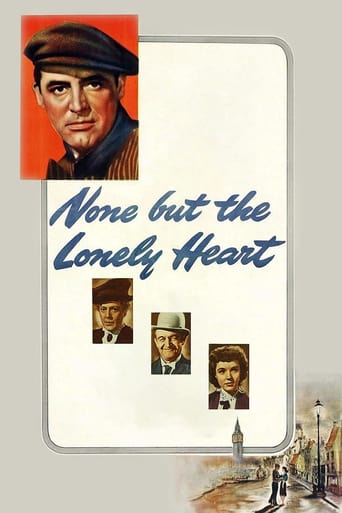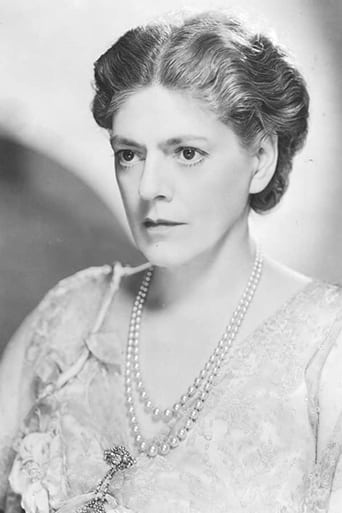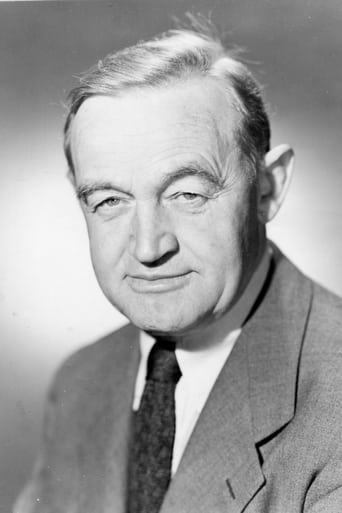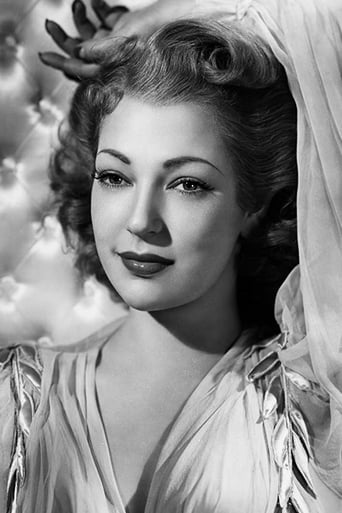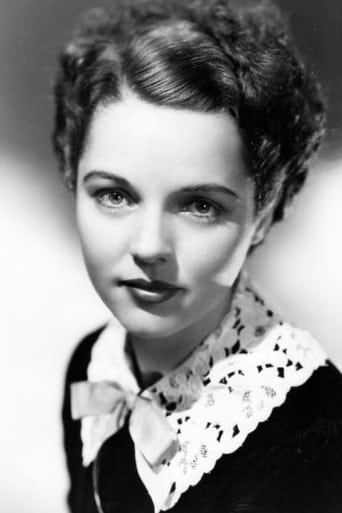Glimmerubro
It is not deep, but it is fun to watch. It does have a bit more of an edge to it than other similar films.
Livestonth
I am only giving this movie a 1 for the great cast, though I can't imagine what any of them were thinking. This movie was horrible
Teddie Blake
The movie turns out to be a little better than the average. Starting from a romantic formula often seen in the cinema, it ends in the most predictable (and somewhat bland) way.
Kien Navarro
Exactly the movie you think it is, but not the movie you want it to be.
dougdoepke
The movie's a wildcard in Grant's otherwise debonair career. Here he's an aimless London slum-dweller, who thinks futility is just the way the world is. So why should he, Ernie Mott (Grant), try for anything better when the world's rigged for defeat. Still, Ernie's got an indulgent, if fatally ill, mother, along with two adoring girlfriends. They might help if he weren't so casual about their affections. The movie's heart is in the right place, as lefty screenwriter-director Odets links the ease of crime with slum conditions. The trouble is it's hard to take Grant (age 40) as either youthful or poverty stricken (couldn't they have dirtied him up a bit). Maybe I've seen too many of his slick light comedies, but I just couldn't forget that this is the great smoothy playing against type. No doubt, he was trying to expand his range, but the choice of vehicles was unfortunate as he himself admitted. The movie itself is about as dingy as any I've seen. The murky b&w is tediously unrelenting. Naturally, that emphasizes the slum-like conditions, but also serves a more practical purpose. Namely, the dimness masks the many studio-bound streets and sets that are about as cheaply done as any of Grant's many films. Frankly, between the unrelenting talk and bleak visuals, my attention wandered. Still, Jane Wyatt is fetching, Barrymore doesn't over-act, Fitzgerald is not too cuddly, while Grant tries his manful best. Too bad, the results aren't better— the 113-minutes could easily have profited by shaving off 20 of those. Anyway, the movie remains more a bleakly done oddity than anything else in Grant's fabulous career.
MartinHafer
It had been some time since I'd last seen this movie and reviewed it, so I watched it again this weekend. Surprisingly, the film definitely improved when seen a second time, though I must still admit that this film was a serious misfire for Cary Grant--almost as bad as his decision to make ONCE UPON A TIME--also in 1944.Cary plays a character perhaps more like he was in real life. Born "Archie Leach" to working class parents, Cary for once gets to play a character more akin to his roots--not the suave and sophisticated upper or middle-class swell. Here in NONE BUT THE LONELY HEART, he plays a cockney guy in a film without a single cockney (or similar) accent!! His mother is played by Ethel Barrymore (an American) and one of his lady friends is Jane Wyatt (also an American). Barry Fitzgerald probably sounds closest to a cockney, but he's Irish. There were a few Brits on board as well (including Grant) but they all sounded too prim and proper and the total effect was "London-like"--having some of the attributes of the city but mostly seeming like a Hollywood back lot. Now considering that the city was in the midst of the Blitz, I really can't completely blame them, but so little effort was made in getting the details right that it annoyed me.As for the story, it was interesting and quite a stretch--but it also ended on such a vague and unsatisfying note that I am not a big fan of the film. Depressing and at times seemingly pointless, it is nevertheless an interesting portrait of a very complex character--who is far more than what first meets the eye. Overall, an interesting failure with enough about it to make it a decent time-passer or a curio for the curious.
theowinthrop
Throughout his career, Cary Grant tried to shake off the comic leading man - sophisticate roles that he fell into. He eventually did get parts in thrillers like NORTH BY NORTHWEST and CHARADES, or serious films like PENNY SERENADE and AN AFFAIR TO REMEMBER showing a bit of edge, but up to his last film WALK DON'T RUN, he performed films that were mostly likable sophisticated comedies like INDISCREET. I suppose it was the flip side of being one of the best looking men in movies. Hitchcock had tried to get him a villainous role in the original concept of SUSPICION, and the studio and Grant's agent vetoed it - so the plot of that film was rewritten to make him look innocent of Joan Fontaine's deepest suspicions. The nearest he got was in the film MR. LUCKY, where he is a shady gambler and swindler, and even can be really violent in a fight scene, but still turns up being more honorable than he originally intended to be. In 1944 Grant was finally able (uniquely for his whole career) to play a movie role which, while hardly villainous, was far more realistic and tragic than anything else he ever played. Ernie Mott is his equivalent to Tyrone Power's "the Great Stanton" in NIGHTMARE ALLEY, the box office failure Darryl Zanuck allowed Power to make that showed he too was a fine actor. After NONE BUT THE LONELY HEART and NIGHTMARE ALLEY Grant and Power were taken seriously as performers by the theater going public.Ernie Mott is a London cockney (which Grant originally was - but rarely got a chance to show on film), who lives with his mother Ma Mott (Ethel Barrymore - in her "Oscar" winning performance) in a second hands goods/minor pawn broker store. Ernie has been rather light hearted and thoughtless, never settling down to a profession. But there are few good professions for such as him. He's in an East London slum (a reference to Whitechapel in the film reminds me that this story of the 1930s is only half a century from Jack the Ripper's rampages). He has two girls in his life - the glamorous Ada (June Duprez) and Aggie, a cellist (Jane Wyatt). Both like him very much, but he admits to Aggie that he favors Ada a bit more.Richard Llewelyn, who wrote HOW GREEN WAS MY VALLEY, wrote the novel for this film (screenplay version by dramatist Clifford Odets), and captures the spirit of that slum quite well. Ernie hates it, and wants something better, but can't concentrate. One day a family friend (Jewish pawnbroker Ike Weber - Konstantine Shane (THE STRANGER, VERTIGO)) tips off Ernie that his mother is dying of cancer. Ernie cleans up his act (he was about to see about prospects in Liverpool), and he starts taking over work from his surprised mother. But although the reforms bring him and the dying woman together, both worry about each other - and fall prey to temptations they really don't want to return to.In Ma's case, she had been a leading fence for stolen goods for many years. If she will handle some more she can earn 500 pounds (in 1939 England a very tidy sum) to leave to Ernie. Ernie, as he dates the luxury loving Ada, finds he needs more money too. There is a snag here - Ernie's opportunity involves him with the local criminal gang boss Jim Mordinoy (George Coulouris). Mordinoy has always considered Ernie a potential gang member, but Ernie has showed little interest. Now Ernie's interested, but Mordinoy has close personal interests in Ada too - and is determined to maintain them whatever anyone (including Ada or Ernie) wants.The film holds up very nicely, with Grant giving the best performance of his career (which did not even get noticed for an Oscar nomination). As mentioned Barrymore did get nominated as the loving but fearful Ma, and won her Oscar (making her and brother Lionel - A FREE SOUL - the only brother and sister "Oscar" winners in movie history to the present). Duprez is painful as a woman torn between real love for Grant and fear of Coulouris' vengeance. Wyatt is painful too, as she has to accept Grant's positioning her as "best friend" rather than girlfriend. Barry Fitzgerald comes into the film in it's middle as Henry Twite, a wise old fellow who does odd jobs and becomes a missing father figure to Grant (Ernie's father was killed at Verdun). Shayne, an actor of considerable strength, had a wonderful part here. Jewish pawn brokers were usually still subjects of humor in movies in 1944, but with rumors of the death camps coming up this was changing. His role of Ike is that of a decent human being in that area, who has to face Coulouris and his thugs at one point - and maintains our full sympathy.I have to make a separate comment about George Coulouris here. I always like watching him, but too frequently his nervousness and short temper or his mental condition made his roles "over - the - top". I don't think Jim Mordinoy is anywhere near that - in fact, with Teck in WATCH ON THE RHINE this is his best performance. Mordinoy is not a ranter - he is quiet and direct and totally without scruple. He is far more dangerous (and smart) than the average thug, and one imagines that even at the end of the film he won't get touched by what happens to his minions. Grant's performance and Barrymore's are the best here, but Coulouris is equally good.The title by the way comes from a song with music by Tschaikowski and words from a poem by Goethe. It was also played by Paul Lukas to Katherine Hepburn in LITTLE WOMEN.
Tilyou1
The film supposedly involves Cary Grant playing himself on sets that evoke his impoverished English childhood, in an anguished drama involving a mother that evokes his anguished mother.I don't know how much of the film had personal meaning to Cary (and how much of the meaning was generated by a publicity department, or imagined by fans) but the result is unsatisfying. Cary despite his genuine Cockney childhood is not convincing as a Cockney, and he comes across as the main wrong note in the film. Like the rest of the sentient universe I am a huge fan generally, and if one felt like arguing, one could argue that Cary's ineptness because it is so rare is revealing. It suggests a conflict -- seen especially early in the movie -- between being Cary Grant, being that English street character he spent his entire life disguising, and whatever this part required. So maybe something personal was at stake, but that's not necessarily the formula for a good movie, and here it isn't.The sets are great though, in a dark "foggy old London curiosity shoppe" kind of way. Ethel Barrymore is... well, Ethel Barrymore and enough said. Eternally noble Jane Wyatt is eternally noble (but we love her that way); in fact everyone is fine, including the fog, played by itself.Except Cary and the story.
